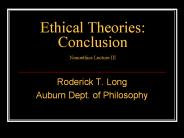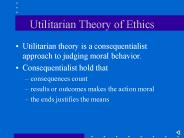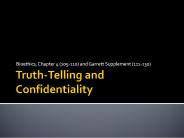Consequentialist PowerPoint PPT Presentations
All Time
Recommended
The Greatest Happiness Principle: Humans only act for the sake of ... By happiness is intended pleasure, and the absence of pain; by unhappiness, pain, ...
| PowerPoint PPT presentation | free to download
Act-egoism: The act egoist would likely advise Jack to take the money, as long ... Rule-egoism: The rule egoist might respond to the situation by applying a ...
| PowerPoint PPT presentation | free to view
Consequentialist Theories of Ethics Do Consequences make an action right? Many ethicists have argued that we should decide moral right and wrong by looking at the ...
| PowerPoint PPT presentation | free to view
Utilitarianism or Consequentialism Good actions are those that result in good consequences. The moral value of an action is extrinsic to the action itself.
| PowerPoint PPT presentation | free to download
Hedonism: we should pursue pleasures that are not mixed with pain (prudence, ... satisfy natural desires (food, sleep), & avoid vain desires (fame, fashion) ...
| PowerPoint PPT presentation | free to view
Hedonism: the good is pleasure. Pursue pleasures not mixed with pain (beauty, prudence, honor, justice, courage, ... this implies that the end justifies the means ...
| PowerPoint PPT presentation | free to view
Utilitarianism. The Principle of Utility ... Utilitarianism. Features of Classical Utilitarianism: ... Utilitarianism. Classical Objections to Utilitarianism: ...
| PowerPoint PPT presentation | free to view
maximise social well-being based on (consequentialist) utilitarianism ... Distributive justice - 'political' or 'social' philosophy - concerned with outcome ...
| PowerPoint PPT presentation | free to download
Deontological Approaches Consequences of decisions are not always the most important elements as suggested by the consequentialist approach. The way you make ...
| PowerPoint PPT presentation | free to download
Deontological Approaches Consequences of decisions are not always the most important elements as suggested by the consequentialist approach. The way you make ...
| PowerPoint PPT presentation | free to download
Acting on consequentialism has bad consequences because if we were to take time ... According to consequentialism, it is ... Eric Clapton 'Tears in Heaven' ...
| PowerPoint PPT presentation | free to view
Introduction to Ethics Lecture 12 ... A Consequentialist moral theory might permit or even require you to punish an innocent ... Philosophy 100 Kantian Ethics Author:
| PowerPoint PPT presentation | free to view
Deontological ethics or deontology (Greek: Deon meaning obligation or duty) is a ... Consequentialism (Teleological Model) refers to those moral theories that hold ...
| PowerPoint PPT presentation | free to download
Introduction to Utlilitarianism What do we already know about Utilitarianism? It s a Consequentialist Theory: focuses on outcomes. It s a Teleological Theory ...
| PowerPoint PPT presentation | free to download
Historical Nuremberg, Geneva Convention, Declaration of Human Rights. Philosophical. Consequentialist (e.g., utilitarianism) Deontological (e.g., rights or duties) ...
| PowerPoint PPT presentation | free to view
... 'machine[s]' as the tools through which that skill is ... Shades of Learned Hand? Pragmatic (consequentialist) interpretation vs. 'scholastic' textualism ...
| PowerPoint PPT presentation | free to view
Ethical Theories: Conclusion Nanoethics Lecture III Roderick T. Long Auburn Dept. of Philosophy Utilitarianism A consequentialist theory: standard for the rightness ...
| PowerPoint PPT presentation | free to download
Ethical Egoism (Objectivist Ethics) Ayn Rand(1905 1982) Russia 20th Century Philosopher ... Ethical Egoism; Relativism; Freedom; Consequentialist. I do what I ...
| PowerPoint PPT presentation | free to view
Susceptible to self deception and sour grapes' Is overly consequentialist ... reject profitable bargains they think are unfair ...
| PowerPoint PPT presentation | free to view
Deontology and Consequentialism are too abstract. They simply construct rules for moral behaviour ... integral part of the quest for truth is understanding the ...
| PowerPoint PPT presentation | free to view
Four categories of service that the natural environment ... a particular form of Utilitarianism, which is 'consequentialist' and 'subjectivist' in nature. ...
Ethical Theory Seeking a Standard for Morally Correct Action
| PowerPoint PPT presentation | free to download
Utilitarianism provides a standard by which we judge which actions are right or wrong, good or bad. Applying the theory Identify the Alternative courses of action ...
| PowerPoint PPT presentation | free to download
An act is Good if it results in the greatest happiness for the greatest number ... Utilitarianism provides a standard by which we judge which actions are right or ...
| PowerPoint PPT presentation | free to download
Chapter 4. Business Ethics. OXYMORON? ACCOUNTING SCANDAL #1. ACCOUNTING SCANDAL #2 ... Why ethics is particularly challenging in business. Class Exercise ...
| PowerPoint PPT presentation | free to view
Ethical egoism - to achieve the best balance of Good over evil in life. Utilitarianism ... Ethical egoism. Utilitarianism. Situation ethics. Deontologist ...
| PowerPoint PPT presentation | free to view
Moral judgment of economic behavior under risk in relation to moral ... P's asked to evaluate how much anger, disgust and contempt they would feel (on a ...
| PowerPoint PPT presentation | free to download
Discussion 9 Consider the selection by Mill which states that the sole criterion of moral is to maximize happiness. Now, consider an instance where you are riding a trolley car.
| PowerPoint PPT presentation | free to download
The Ethical Use of GMOs 25 March 2005 Dr. Sakarindr Bhumiratana President National Science and Technology Development Agency (NSTDA) GM Products: Benefits and ...
| PowerPoint PPT presentation | free to download
Introduction to Ethical Theory I Last session: our focus will be on normative medical ethics, i.e., how people should behave in medical situations
| PowerPoint PPT presentation | free to download
Bioethics Vocabulary and Theory Ethics A field of human inquiry that examines the bases of human goals and the foundations of right and wrong human actions that ...
| PowerPoint PPT presentation | free to download
EECS 690 April 9 A top-down approach: This approach is meant to generate a rule set from one or more specific ethical theories. Wallach and Allen start off ...
| PowerPoint PPT presentation | free to download
... (CIOMS: the Council for International Organizations of Medical Sciences) Universal Declaration on Bioethics and Human Rights (UNESCO; United Nations ...
| PowerPoint PPT presentation | free to view
A maxim is a principle of action- the contractor who breaks a promise acts on ... Universalizing this maxim he would be willing that promises be broken whenever ...
| PowerPoint PPT presentation | free to view
Daunting Dilemmas and Dualities Corporate Grantmakers Conference June 9, 2005 Graham Phaup The Institute for Global Ethics If you think making money raises ethical ...
| PowerPoint PPT presentation | free to view
Bioethics, Chapter 4 Truthfulness can be specified by two hypothetical commands: If you communicate, do not lie (refusing to communicate is not lying) You must ...
| PowerPoint PPT presentation | free to download
Senior Research Fellow, PRIO (Int'l Peace Research Institute, Oslo) ... connection between our 'ethics' and our 'morals' between what we think and who ...
| PowerPoint PPT presentation | free to view
Justice in Adaptation to Climate Change A Framework of Analysis and Justice in International Environmental Law on Adaptation Jouni Paavola W. Neil Adger
| PowerPoint PPT presentation | free to download
... (speciesism) Weak anthropocentrism Pathocentrism Biocentrism Ecocentrism A selection of prominent issues Should scientists consider the possibility that their ...
| PowerPoint PPT presentation | free to view
20-30% of IT Spend. IT Budget (before) Savings in choosing right. projects ... Better Alignment of entire IT Spend to Goals. Vendor Management considerably simpler ...
| PowerPoint PPT presentation | free to view
Ethics-Opening Questions-Area of Study-Terms-Goals-Guiding Questions Opening Questions 1). How do you know if you ve made a morally right or morally wrong decision?
| PowerPoint PPT presentation | free to view
The Ethical Basis for Journal Disclosure of Author/Editor Financial Interest Sheldon Krimsky Tufts University, Medford, MA 02155 www.tufts.edu/~skrimky
| PowerPoint PPT presentation | free to view
PHIL 2 Philosophy: Ethics in Contemporary Society Week 1 Topic Outlines
| PowerPoint PPT presentation | free to download
A convoy of food trucks is on its way to a refugee camp during a famine in Africa. ( Airplanes cannot be used.) You find that a second camp has even more refugees. ...
| PowerPoint PPT presentation | free to download
Ethics Theories and Principles Aims Definition Scope Theories and principles Relevance of Ethics Public profile/ Awareness/ Policy: Frozen embryos Transplant funding ...
| PowerPoint PPT presentation | free to download
Ethical Principles, Quick Tests, And Decision-Making Guidelines Outline Decision criteria for ethical reasoning Ethical relativism: A self-interest approach ...
| PowerPoint PPT presentation | free to view
... accused of encouraging formula over breast feeding among developing countries) ... claims related to either the benefits, rewards or hazards related to the ...
| PowerPoint PPT presentation | free to view
Introduction to Ethics Lecture 11 Utilitarianism By David Kelsey
| PowerPoint PPT presentation | free to view
Media ethics. This branch of media studies concerns itself with what media practitioners and regulators (and still others in some cases) should do
| PowerPoint PPT presentation | free to download
Chapter 12: Sexual Morality Foundational Introduction - Various Sexual Practices and Behaviors What Is Sexual and What is Not? Embodied persons as the object of ...
| PowerPoint PPT presentation | free to download
Chapter Eight: War, Terrorism and Civil Liberties Applying Ethics: A Text with Readings (10th ed.) Julie C. Van Camp, Jeffrey Olen, Vincent Barry
| PowerPoint PPT presentation | free to download
Egoism: my happiness is the greatest good ... Egoism allows for no 'moral point of view' of an ideal observer who is impartial, ...
| PowerPoint PPT presentation | free to view
Deal with local conditions not controlled. Methods. Interviews. Observation. Material Culture ... Research. Upper Saddle River, NJ: Pearson Education. ...
| PowerPoint PPT presentation | free to view
Consequences: if we do this, then this is what will probably happen. ? What good and bad things count as ... Ayn Rand; USA famous book 'The Fountainhead' ...
| PowerPoint PPT presentation | free to view
Daniel Dennett is a philosopher and cognitive scientist. He is a Professor of Philosophy at Tufts University and is known for his contributions to the field of philosophy of mind and philosophy of science. Dennett advocates that human consciousness can be explained in terms of brain functioning. He has written extensively on consciousness, free will, and the evolution of human cognition (Wallgren 32). He is also known for his criticism of certain forms of mysticism and religious belief and his defense of the compatibility of science and religion. Dennett is a prominent figure in philosophy and cognitive science. His work has influenced contemporary debates about the nature of consciousness and the relationship between the mind and brain. Therefore, this paper will quote and describe the main questions that Daniel Dennett explains in relation to metaphysics, epistemology, and ethics and how he explains the concepts of religion and Christianity.
| PowerPoint PPT presentation | free to download
























































